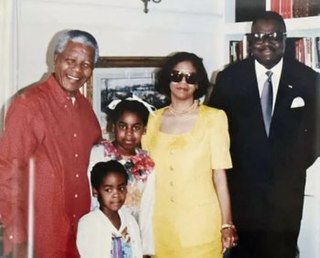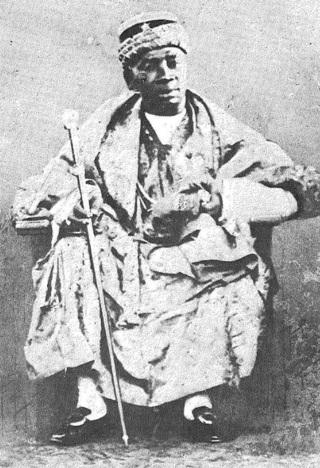Related Research Articles

Efunroye Tinubu, born Ẹfúnpọ̀róyè Ọ̀ṣuntinúbú, was a powerful Yoruba female aristocrat, merchant, and slave trader in pre-colonial and colonial Nigeria.

The Oba of Lagos, also known as the Eleko of Eko, is the traditional ruler (Oba) of Lagos.
Adeyinka Oyekan II was Oba of Lagos from 1965 to 2003. He was the grandson of Oba Oyekan I.
Akitoye, sometimes wrongly referred to as Akintoye, reigned twice as Oba of Lagos; first, from 1841 to 1845, and a second time, from 1851 to 1853. His father was Oba Ologun Kutere and his siblings were Obas Osinlokun and Adele.
The Olowu of Owu is the paramount Yoruba king of Owu kingdom. The first Olowu of Owu is also one of the original kings in Yorubaland.

The Akure Kingdom is a traditional state with headquarters in Akure, Ondo State, Nigeria. It is the successor to an ancient Yoruba city state of the same name. The ruler bears the title "Deji of Akure".
The following is a timeline of the history of the metropolis of Lagos, Nigeria.

Oloye Antonio Oladeinde Fernandez of Dudley was a Nigerian billionaire, business magnate and diplomat, a Pan-African leader and Permanent Representative of the Central African Republic to the United Nations. He was considered one of the richest men in Africa.

Oba Sanusi Olusi was a wealthy trader who succeeded Ibikunle Akitoye as Oba of Lagos from 1928 to 1931 during what some historians refer to as the "Interregnum" years of the exiled Oba Eshugbayi Eleko. Oba Sanusi Olusi was a grandson of Olusi, and great grandson of Oba Ologun Kutere. Sanusi Olusi was the first Muslim Oba of Lagos.
Oba Gabaro who reigned from 1669–1704 was the third Oba of Lagos, son and heir to Oba Ado, and grandson of Ashipa. His siblings were Akinsemoyin, and Erelu Kuti.
'Oba Falolu Dosunmu served as the Oba of Lagos from 1932 to 1949, succeeding Eshugbayi Eleko. He was a former fisherman and a member of the House of Dosunmu.

Rilwan Babatunde Osuolale Aremu Akiolu is the incumbent Oba of Lagos.
Ologun Kutere reigned as Oba of Lagos from around the 1780s to around 1803. He succeeded Oba Eletu Kekere who reigned between 1775 and 1780. "Ologun" is the Yoruba word for "War General".
The Territories of the Awori are a part of Nigeria inhabited by the Awori tribe sub-ethnic group of the Yoruba people, speaking a distinct dialect of the Yoruba language. Traditionally, Awori are found in two Nigerian States: Ogun and Lagos.
Oba Akinsemoyin reigned as Oba of Lagos from around 1704 to 1749. His father was Oba Ado and his siblings were Erelu Kuti and Oba Gabaro, whom he succeeded.

Kosoko was a member of the Ologun Kutere Lagos Royal Family who reigned as Oba of Lagos from 1845 to 1851. His father was Oba Osinlokun and his siblings were Idewu Ojulari, Olufunmi, Odunsi, Ladega, Ogunbambi, Akinsanya, Ogunjobi, Akimosa, Ibiyemi, Adebajo, Matimoju, Adeniyi, Isiyemi, Igbalu, Oresanya, and Idewu-Ojulari.
Oba Osinlokun or Eshinlokun reigned as Oba of Lagos from 1821 to 1829. His father was Oba Ologun Kutere and his siblings were Obas Adele and Akitoye, making the Ologun Kutere Obaship line the dominant one in Lagos. Among Osinlokun's children were Idewu Ojulari, Kosoko, and Opo Olu.
Dosunmu, referred to in British documents as Docemo, reigned as Oba of Lagos from 1853, when he succeeded his father Oba Akitoye, until his own death in 1885. He was forced to run away to Britain under the threat of force in August 1861.
The Eletu Odibo of Lagos is the traditional nobleman that has historically served as the principal kingmaker of the Oba of Lagos. As head of the Akarigbere class of chiefs, the Eletu Odibo also serves as the prime minister of the Oba.
Chief Abiola Dosunmu, is a Nigerian businesswoman, socialite and traditional aristocrat. In addition to a variety of other chieftaincy titles, she currently holds that of the Erelu Kuti IV of Lagos.
References
- ↑ Nnamdi, Onyirioha (2017-12-15). "Erelu Kuti IV of Lagos, Abiola Dosunmu, sheds more light on the true origin of Lagos people". Legit.ng - Nigeria news. Retrieved 2020-02-01.
- ↑ "Dosunmu 70th Birthday Lecture Holds Friday". July 25, 2017. Retrieved April 28, 2020.